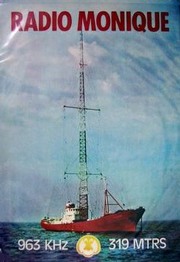© 2014-


Radio Monique - History (2)
Questions were asked again in the Dutch Parliament on 13th June 1985 about Radio Monique. The Broadcasting Minister was asked why the Government and the law enforcement agencies were taking no action over the station and suggested that the Ross Revenge (as well as the Laser ship, Communicator) should be forcibly towed inside territorial waters to bring them within official jurisdiction. However, a spokesman for the Dutch Office of Justice said later that the subject of offshore broadcasting was not high on their list of priorities and until the Radio Paradijs case had been finally resolved no action would be taken against other offshore radio stations or their ships.
The results of a Dutch public opinion poll conducted during June 1985 (by Inter/View) showed that 25% of people had heard of Radio Monique while 11% -
On 9th August 1985 the British authorities started a surveillance operation by stationing a vessel (usually the Dioptric Surveyor) near the radio ships Ross Revenge and Communicator. This was intended to monitor (and deter) tendering operations to the radio ships and had a significant impact for the offshore stations who found it difficult to obtain supplies, spares, new programmes and crew changes. This operation was nicknamed ‘Euroseige’.
In contrast to the high profile British action the Dutch authorities chose to pursue the offshore stations, particularly Radio Monique, behind the scenes. A spokesman for the Dutch Department of Justice in Amsterdam, Henk Wooldrik said:-
There was some concern in Holland that, because of the presence of Radio Monique's Dutch staff on board the Ross Revenge, the Dioptric Surveyor's surveillance might lead to another towing-
However, signs of difficulties in supplying the Ross Revenge became apparent to listeners later in August 1985. The half-
During the sum mer of 1985 Radio Monique had built a large audience and attracted a number of substantial advertising contracts, but both of these success indicators began to fall by the end of November. The problems can be traced to difficulties with tendering the Ross Revenge following the start of the DTI surveillance operation in August 1985. Previously the station had received a tender twice weekly, providing a vital delivery of new programme material, commercials and technical supplies. This tendering service had slipped to once every two weeks by the late summer of 1985 and after the start of 'Euroseige' a tender only visited the Ross Revenge perhaps every six weeks.
mer of 1985 Radio Monique had built a large audience and attracted a number of substantial advertising contracts, but both of these success indicators began to fall by the end of November. The problems can be traced to difficulties with tendering the Ross Revenge following the start of the DTI surveillance operation in August 1985. Previously the station had received a tender twice weekly, providing a vital delivery of new programme material, commercials and technical supplies. This tendering service had slipped to once every two weeks by the late summer of 1985 and after the start of 'Euroseige' a tender only visited the Ross Revenge perhaps every six weeks.
This disruption in supplies affected the technical operation of the station as well as the programming side-
As a consequence of these disruptions Radio Monique quickly lost listeners and many advertisers failed to renew or enter into new contracts. They were worried not only by the station's falling audience figures and also by increased attention from the Dutch authorities as the result of the British Government's surveillance operation.
By the beginning of September, however, tenders were obviously getting through once more as new or replacement DJs appeared on the station as well as a fresh batch of commercials and a new supply of taped programmes.
Despite all these difficulties Radio Monique (like Radio Caroline) managed to continue broadcasting throughout and beyond the period of the DTI surveillance operation, which ended in December 1985.


Click on picture to enlarge

History
Key Dates
Ship and Location
Technical
Staff
Programmes









Back to Britain Gallery


Back to Netherlands/Belgium Gallery


Back to Radio Monique
